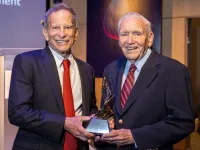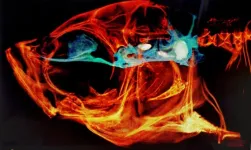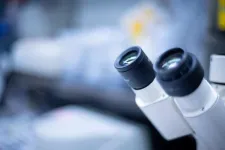(Press-News.org) The 2024 Richard N. Merkin Prize in Biomedical Technology was awarded to F. William Studier of Brookhaven National Laboratory in a ceremony and symposium at the Broad Institute on September 17, 2024. The prize, created by the Merkin Family Foundation and administered by the Broad, recognizes novel technologies that have significantly improved human health and carries a $400,000 award. [Event Video]
Studier was announced as the winner in May for his development, in 1986, of an efficient, scalable method of producing RNA and proteins in the laboratory. His T7 expression technology can be used to make large quantities of nearly any RNA or protein. The approach has been — and continues to be — a mainstay of biomedical research and the workhorse for producing the mRNA COVID-19 vaccines, which have extended millions of lives, and numerous other therapeutics and diagnostics. [Studier Bio]
In remarks at the symposium, Richard N. Merkin, MD praised Studier for his innovative spirit. "I asked Bill what stimulated him, and he said, 'I made sure I did not embrace the status quo, that I did not embrace incrementalism. I'm a pattern breaker. I wanted to break the patterns that others had used, and depart from current habits, challenging conventional wisdom.' That's what this award is about."
Turning to Studier, Dr. Merkin added, "There are many people in the audience that have a crazy idea, that don't want to change things five percent, but want to change things tenfold. Those are the people that will change the world. Bill, you're the epitome of that. You have helped millions of people. Biomedicine has changed because of you, and humanity needs to acknowledge people like you.”
Nobel laureate Harold Varmus, the Lewis Thomas University Professor at Weill Cornell Medicine and chair of the Merkin Prize selection committee, gave an overview of the prize, applauding its emphasis on technologies that have made a significant impact on biomedicine. "Discovery does not occur without the invention of technologies. It’s tools and technologies that allow us to see further than others have seen, and to make those discoveries that are all too often the meat and potatoes of recognition.”
Todd Golub, director and founding core institute member of the Broad Institute, thanked Merkin, whose philanthropic partnership with the Broad has spanned more than 15 years. "Dick Merkin is the most uncommon of philanthropists. He has a humble, self-effacing demeanor, and yet he is great at pushing people to make bold bets and to try to make the impossible possible."
Venki Ramakrishnan, group leader at the MRC Laboratory of Molecular Biology in Cambridge, England, who won the 2009 Nobel Prize in Chemistry and served on the Merkin Prize selection committee, introduced the scientific talks and also praised Studier’s professionalism, humility, and generosity, "Bill has always been what we think of as a scientist's scientist. Anything he did, he shared with the entire scientific community. And now, there's probably not a single lab in this building that has not used the T7 system."
Studier, his wife Susan, his family, former colleagues and guests attended the ceremony that included a symposium, reception, and private dinner. Attending the Merkin Prize honors at the Broad for the first time this year were Gerun Riley, President of The Eli and Edythe Broad Foundation, and Edythe Broad, Co-Founder of The Eli and Edythe Broad Foundation.
“It is so important to recognize groundbreaking science and the remarkable individuals who have made a difference so more people are aware of these achievements," said Edythe Broad. "If Eli were here, he would be incredibly proud of what Dick has accomplished,” she continued. “It’s changing the world.”
At the symposium, John Shanklin, chair of biology at Brookhaven National Laboratory, who considered Studier a mentor for many years, described the world-changing impact of the T7 expression technology. Pardis Sabeti, a core institute member at the Broad and a professor at Harvard University and Harvard T.H. Chan School of Public Health, lauded Studier for how the technology has enabled strategies for infectious disease control. In a video message, Melissa J. Moore, chief scientific officer emerita of Moderna Therapeutics emphasized how T7 has enabled scientists to generate RNA at an industrial scale, proving to be the workhorse for making mRNA Covid-19 vaccines. Fei Chen, core institute member at the Broad, an assistant professor at Harvard University, and a 2021 Merkin Institute Fellow, discussed his lab’s use of T7 polymerase to build a new set of programmable tools.
Dr. Merkin’s partnership with the Broad includes the Merkin Institute Fellows, established in 2012 as the Broad’s first endowed fellowship; the Merkin Institute for Transformative Technologies in Healthcare, launched in 2017 to support paradigm-shifting projects from researchers at the Broad, Harvard, MIT, and the Harvard-affiliated hospitals; the Richard Merkin Professorship (also established in 2017), an endowed professorship held by David Liu, who leads the Merkin Institute for Transformative Technologies in Healthcare; and a generous new commitment in 2021 that advanced the aforementioned programs and launched the Merkin Prize. It was also in 2021 that, in recognition of Merkin’s partnership, the Broad named its building at 415 Main Street the Richard N. Merkin Building.
Nominations for the 2025 Merkin Prize are now open and will close on December 6, 2024, at 11:59 p.m. ET.
For further information on how to nominate for the 2025 Merkin Prize, please visit the prize website. Eligibility extends to all investigators who have developed relevant health innovations, regardless of their place of employment, including academia, the commercial sector, or government. Both teams and individuals who have made a profound impact on medicine by pioneering a transformative technology are eligible.
***
About the Merkin Family Foundation
The Merkin Family Foundation was founded by visionary health care executive Richard Merkin, MD.
Richard Merkin, MD is the founder and CEO of Heritage Provider Network, Inc. (HPN). HPN is one of the largest physician founded and physician owned managed care organizations in the country dedicated to value-based healthcare delivery improvements. HPN develops and manages coordinated, patient-doctor centric, integrated health care systems that offer some of the strongest solutions for the future of health, care, and cost in the United States. HPN and its affiliates operate in New York, California, and Arizona, providing high-quality, cost-effective healthcare with over one million patient members. HPN is dedicated to quality, affordable health care, and putting patients’ wellness first.
About Broad Institute of MIT and Harvard
Broad Institute was launched in 2004 to empower this generation of scientists to transform medicine. The Broad Institute seeks to describe the molecular components of life and their connections; discover the molecular basis of major human diseases; develop approaches to diagnostics and therapeutics; and disseminate discoveries, tools, methods, and data to the entire scientific community.
Founded by MIT, Harvard, Harvard-affiliated hospitals, and the visionary Los Angeles philanthropists Eli and Edythe L. Broad, the Broad Institute includes faculty, professional staff, and students from throughout the MIT and Harvard biomedical research communities and beyond, with collaborations spanning over 100 private and public institutions in more than 40 countries worldwide.
END
F. William Studier receives the 2024 Merkin Prize in ceremony at the Broad Institute for developing technology used to produce millions of doses of COVID-19 vaccines
The groundbreaking, scalable technology is widely used in laboratories around the world today to efficiently produce large amounts of protein and RNA.
2024-10-16
ELSE PRESS RELEASES FROM THIS DATE:
Applications open for School of Advanced Science on Structural Safety
2024-10-16
The “São Paulo School of Advanced Science on Structural Safety and its role in reducing greenhouse gas emissions by the built environment” will be held May 3-16, 2025, in Brazil, at the São Carlos School of Engineering of the University of São Paulo in its São Carlos campus.
Reporters are invited to register for the scientific sessions and short courses, which will present state-of-art science and results of new research.
This advanced science school will address the main challenges related to Structural Safety ...
Scientists use Allen Telescope Array to search for radio signals in the TRAPPIST-1 star system
2024-10-16
October 16, 2024, Mountain View, CA - Scientists at the SETI Institute and partners from Penn State University used the Allen Telescope Array (ATA) to search for signs of alien technology in the TRAPPIST-1 star system. The team spent 28 hours scanning the system, looking for radio signals that could indicate extraterrestrial technology. This project marks the longest single-target search for radio signals from TRAPPIST-1. Although they didn’t find any evidence of extraterrestrial technology, their work provided valuable data ...
Zebrafish as a model for studying rare genetic disease
2024-10-16
Fukuoka, Japan—Nager syndrome, or NS, is a rare genetic disease that affects the development of the face and limbs, usually causing anomalies in the bone structures of the jaws, cheeks, and hands. With a prevalence of less than 100 cases ever reported, not much is known about the disease except the fact that mutations in the SF3B4 gene are its primary cause. Now, in a recent study made available online on September 15, 2024 and upcoming in the November issue of International Journal of Biological Macromolecules, researchers from Kyushu University have developed a convenient approach to explore the underlying mechanisms ...
A synthetic molecular switch lets you 'paint' with natural light
2024-10-16
Liquid crystals exist in a phase of their own. They can flow like liquids, but because their molecules are arranged in a somewhat orderly way, they can be easily manipulated to reflect light. This flexibility has made liquid crystals the go-to material for energy-efficient phone, TV, and computer display screens.
In a new study in Nature Chemistry, researchers at Dartmouth and Southern Methodist University hint at other applications for liquid crystals that might one day be possible, all powered by natural light. They include liquid crystal ...
Honoring a career of outstanding achievement
2024-10-16
NEWPORT NEWS, VA – This year, the U.S. Department of Energy's Thomas Jefferson National Accelerator Facility celebrates the 40th anniversary of its founding to probe the secrets of the subatomic universe. And for 39 of those years, esteemed physicist Volker D. Burkert has been an important part of its mission.
Now, Burkert is being honored for his contributions to advancements in experimental physics with the prestigious Tom W. Bonner Prize in Nuclear Physics. The citation reads: “For exemplary leadership in the development of high-performance instrumentation for large acceptance spectrometers that have enabled breakthroughs in fundamental nuclear ...
MSK research highlights, October 15, 2024
2024-10-16
A new tactic for overcoming breast cancer drug resistance
The most common type of breast cancer, estrogen receptor positive, has been effectively treated with hormone therapy combined with drugs that block cell division called CDK4/6 inhibitors. However, it has been impossible to predict how long people will respond to this drug combination. In some patients, the disease is controlled for years, but in others, the cancer starts progressing again after just a few months. This presents ...
Hot news flash: Menopause can impact a woman’s heart health
2024-10-16
DALLAS, Oct. 16, 2024 — The risk of heart disease increases with age for most people, however, for women that may be even more true. The menopause transition, those years leading up to and through menopause, is a time of increasing heart disease risk, according to an American Heart Association scientific statement published in the flagship journal Circulation in 2020.
“While many people think that breast cancer is the leading killer of women in the U.S., in ...
Standing more may not reduce cardiovascular disease risk, could increase circulatory disease
2024-10-16
EMBARGO: SYDNEY: 17 October 2024, 00.01 | NEW YORK: 16 October 2024, 09:00
Standing more may not reduce cardiovascular disease risk, could increase circulatory disease
Standing has gained popularity among people looking to offset the harms of a sedentary lifestyle often caused by spending long days sitting in front of the computer, television or driving wheel. Standing desks have become a popular option among office workers, and in other industries like retail, workers may opt to stand instead of sit.
However, their efforts may not produce the intended result. New University of Sydney research has shown that over ...
Video series aims at improving indoor air quality
2024-10-16
Improving indoor air quality is the goal of a new video series developed by experts at the University of California, Davis in collaboration with the California Department of Public Health. Aimed at building and facility managers, the videos distill the science of air quality into steps building and facility managers can take to remove pollutants, including viruses, from the place we spend most of our time -- indoors.
“The goal is to help people understand the issues around indoor air quality, how it is related to disease, and what managers can do to make it better,” said Professor Chris Cappa, chair of the Department of Civil and Environmental ...
Men and women process pain differently, study finds
2024-10-16
In a new study evaluating meditation for chronic lower back pain, researchers at University of California San Diego School of Medicine have discovered that men and women utilize different biological systems to relieve pain. While men relieve pain by releasing endogenous opioids, the body’s natural painkillers, women rely instead on other, non-opioid based pathways.
Synthetic opioid drugs, such as morphine and fentanyl, are the most powerful class of painkilling drugs available. Women are known to respond poorly to opioid therapies, which use synthetic opioid molecules to bind to the same receptors as naturally-occurring endogenous ...
LAST 30 PRESS RELEASES:
Alkali cation effects in electrochemical carbon dioxide reduction
Test platforms for charging wireless cars now fit on a bench
$3 million NIH grant funds national study of Medicare Advantage’s benefit expansion into social supports
Amplified Sciences achieves CAP accreditation for cutting-edge diagnostic lab
Fred Hutch announces 12 recipients of the annual Harold M. Weintraub Graduate Student Award
Native forest litter helps rebuild soil life in post-mining landscapes
Mountain soils in arid regions may emit more greenhouse gas as climate shifts, new study finds
Pairing biochar with other soil amendments could unlock stronger gains in soil health
Why do we get a skip in our step when we’re happy? Thank dopamine
UC Irvine scientists uncover cellular mechanism behind muscle repair
Platform to map living brain noninvasively takes next big step
Stress-testing the Cascadia Subduction Zone reveals variability that could impact how earthquakes spread
We may be underestimating the true carbon cost of northern wildfires
Blood test predicts which bladder cancer patients may safely skip surgery
Kennesaw State's Vijay Anand honored as National Academy of Inventors Senior Member
Recovery from whaling reveals the role of age in Humpback reproduction
Can the canny tick help prevent disease like MS and cancer?
Newcomer children show lower rates of emergency department use for non‑urgent conditions, study finds
Cognitive and neuropsychiatric function in former American football players
From trash to climate tech: rubber gloves find new life as carbon capturers materials
A step towards needed treatments for hantaviruses in new molecular map
Boys are more motivated, while girls are more compassionate?
Study identifies opposing roles for IL6 and IL6R in long-term mortality
AI accurately spots medical disorder from privacy-conscious hand images
Transient Pauli blocking for broadband ultrafast optical switching
Political polarization can spur CO2 emissions, stymie climate action
Researchers develop new strategy for improving inverted perovskite solar cells
Yes! The role of YAP and CTGF as potential therapeutic targets for preventing severe liver disease
Pancreatic cancer may begin hiding from the immune system earlier than we thought
Robotic wing inspired by nature delivers leap in underwater stability
[Press-News.org] F. William Studier receives the 2024 Merkin Prize in ceremony at the Broad Institute for developing technology used to produce millions of doses of COVID-19 vaccinesThe groundbreaking, scalable technology is widely used in laboratories around the world today to efficiently produce large amounts of protein and RNA.





